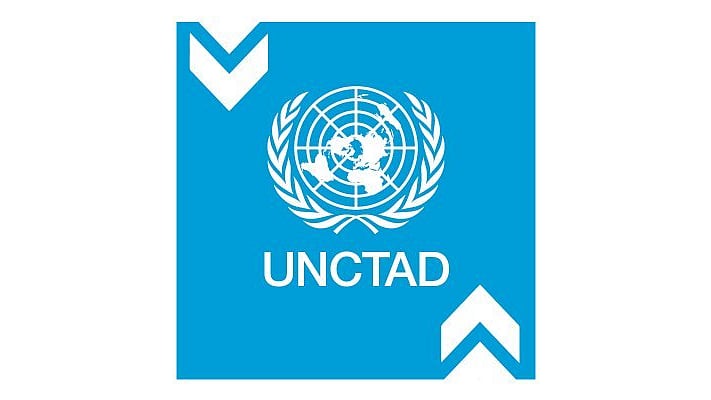
UNCTAD 16 launched the Seville Forum on Debt, a platform to bring creditors, borrowers and financial institutions together to design fairer debt solutions.
Credit: X/@UNCTAD
When the 16th session of the United Nations Conference on Trade and Development (UNCTAD 16) met in Geneva from October 20-23, the mood was one of urgency. Sixty years after its founding in 1964, the world’s premier body linking trade with development found itself confronting a new paradox: trade is expanding, yet development gains are narrowing. The conference theme — ‘Shaping the Future: Driving Economic Transformation for Equitable, Inclusive and Sustainable Development’ — was both an aspiration and a warning.
The loudest alarm in Geneva was about debt. Developing nations, especially the least developed and small island states, are trapped in a vicious cycle of borrowing to service old loans while sacrificing investments in people. UNCTAD’s Secretary-General warned that “many countries now face a tragic choice between paying debts and educating their children”. Global public debt has climbed past $102 trillion, with developing countries shouldering roughly a third. Interest payments alone exceed $900 billion annually — more than many countries’ combined health and education budgets.
In response, UNCTAD 16 launched the Seville Forum on Debt, a platform to bring creditors, borrowers and financial institutions together to design fairer debt solutions. The initiative, led by Spain, was hailed as one of the few concrete outcomes of the conference. It represents an attempt to shift the conversation from debt relief to debt justice — linking repayment frameworks to Sustainable Development Goals.
UNCTAD’s traditional mandate has been to make trade a lever for development rather than an end in itself. Yet, global trade today is fragmented along geopolitical lines. Tariff uncertainty, technological decoupling and supply-chain realignments threaten to leave developing economies stranded. The UNCTAD 16 discussions repeatedly highlighted the precarious position of small and medium-sized enterprises in the Global South, whose access to investment and technology is shrinking.
Digital divides were another major concern. The conference warned that fewer than one-third of developing countries possess national strategies to harness artificial intelligence and data economies. “Digital divides are deepening into digital canyons,” said one delegate. Without infrastructure, skills or data governance frameworks, developing economies risk remaining mere consumers of digital products rather than creators of value.
Beneath the statistics lies a deeper malaise: the erosion of faith in multilateralism. From debt restructuring to trade governance, the existing global economic architecture — designed decades ago — no longer reflects contemporary realities. Developing countries have limited say in setting rules that directly affect them.
Despite these limitations, UNCTAD retains a unique legitimacy. It is still the only global forum that explicitly places development — not just liberalisation — at the centre of trade policy. Its research on productive capacities, digital readiness and investment in sustainable infrastructure provides developing countries with analytical tools to craft inclusive strategies. Civil society groups, including feminist and labour organisations, also used the Geneva session to call for people-centred trade that recognises unpaid care work, gender inequality and environmental limits.
For countries like India and states like Karnataka that aspire to deepen global linkages, UNCTAD’s agenda offers valuable lessons. The organisation’s emphasis on building domestic productive capacities — rather than relying solely on export markets — aligns with initiatives such as Make in India, Digital India and local skill-building programmes. It underlines that trade policy must serve structural transformation, not perpetuate dependency.
Yet the credibility of UNCTAD will depend on whether it can move from ideas to impact. Its conferences have often produced eloquent declarations that fade without follow-through. Implementation gaps persist because of limited resources, weak monitoring and a lack of coordination with national policies.
A reinvigorated UNCTAD must therefore embrace a few strategic shifts. First, it should strengthen implementation support — helping member countries design debt-management, digital-readiness and investment-promotion frameworks that align with national priorities. Second, it must widen its tent to include sub-national actors — provinces, states and city governments — where trade and investment translate into tangible livelihoods. Finally, the organisation must cultivate new coalitions that blend governments, academia, civil society and the private sector to make global trade more accountable and human-centred.
UNCTAD 16 was not merely another diplomatic gathering. It was a moment of reckoning for an institution born from the optimism of the post-colonial era, now operating in a world marked by inequality, debt and digital disruption. Its challenge is formidable: to remain relevant in a fractured multilateral order and to prove that trade can still be a pathway to justice, not exploitation.
If Geneva 2025 is to be remembered for more than speeches, the coming months must see real commitments — on debt sustainability, digital inclusion and fairer global finance. Otherwise, as one delegate observed, “We will continue to meet to discuss development, while development itself passes us by.”
(The writer is an Hon Professor at Mahatma Gandhi Rural Development and Panchayat Raj University, Gadag; Adjunct Professor at Kristu Jayanti University, Bengaluru; and Visiting Professor at St Claret College, Ziro, Arunachal Pradesh)